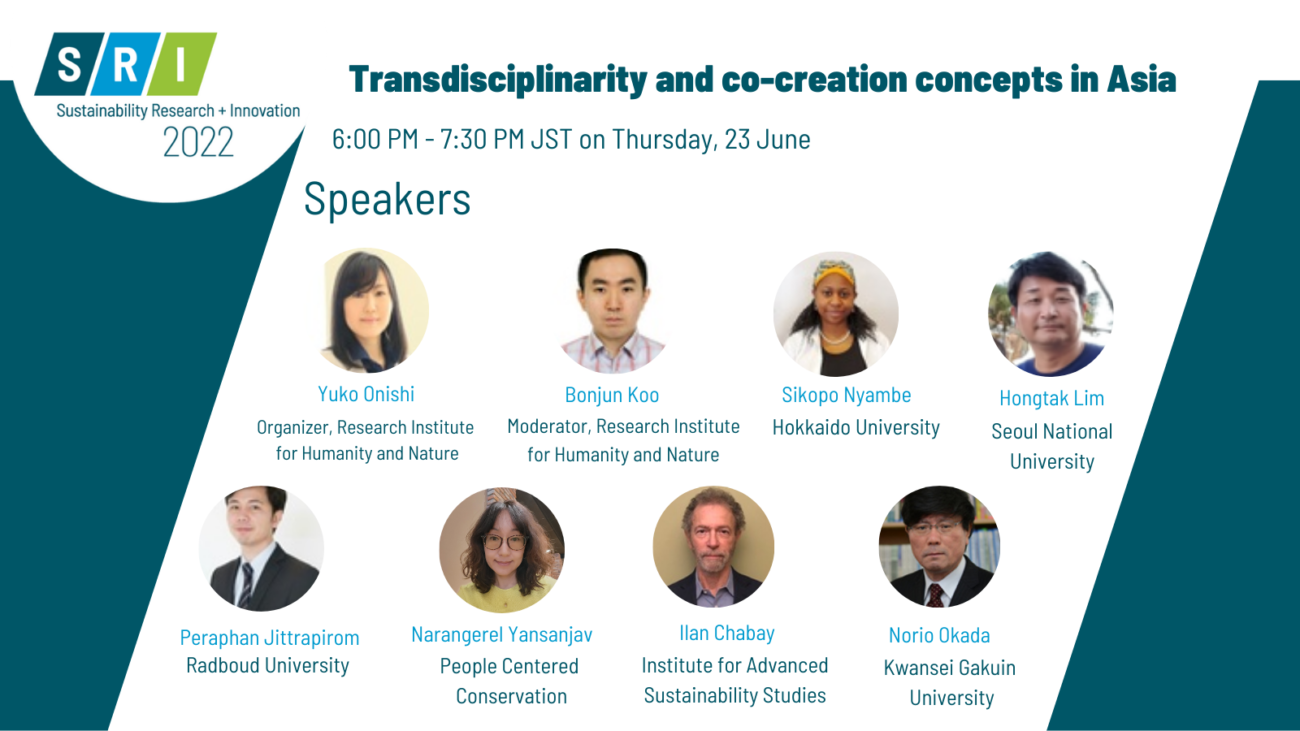
In the Sustainability Research & Innovation Congress 2022 (SRI2022) hosted by the Belmont Forum and Future Earth, Co-creation project hosted a session entitled “Transdisciplinarity and co-creation concepts in Asia” on the 23rd of June. This session was initiated to examine the current status of transdisciplinary (TD) research in Asia and explore its future directions with participants from a wide range of countries.
Dr. Hong-Tak Lim, a research associate professor at Seoul National University presented on TD research approaches in Korea. He provided a definition of TD and introduced TD research activities in Korea, focusing on the living lab, a popular TD research approach in Korea.
Prof. Noria Okada, a former director of the Disaster Prevention Research Institute of Kyoto University, emphasized that transdisciplinary approaches need communicative spaces to enhance all relevant stakeholders’ coping capacity. Among his more than 30 years of transdisciplinary research achievements, he introduced the case of developing an action plan with residents in response to the Mount Merapi eruption in Indonesia.
Dr. Peraphan Jittrapirom an assistant professor at Radboud University shared the project involving different stakeholders to support a transition toward a more sustainable transport system. He introduced participatory methods and tools his team used, including the group model building (GMB) method to share, process, and structure knowledge and understanding of a complex issue.
Ms. Narangerel Yansanjav, who leads a Mongolian NGO called People Centered Conservation, introduced their participatory action-oriented activities with communities in Mongolia.
Prof. Ilan Chabay of the Institute for Advanced Sustainability Studies spoke on transdisciplinarity as building a process of mutual learning with communities seeking to address complex challenges for sustainable futures. He also shared views on TD approaches being taken in parts of Asia.
Dr. Sikopo Nyambe of Hokkaido University, who carried out participatory action research with peri-urban communities in Lusaka, Zambia, presented a case study in Zambia, to establish residents’ definition of peri-urban water, sanitation, and hygiene and their priorities. She described how the research team used “photovoice” as a participatory research tool in several community areas.
In the discussion that followed, Prof. Yoshiyuki Yama of Kwansei Gakuin University, Dr. Dong Un Park of Science and Technology Policy Institute in Korea, Dr. Subhajyoti Samaddar and Dr. Genta Nakano of Disaster Prevention Research Institute of Kyoto University participated as panelists, and several others also participated the discussions through chat boxes throughout the session.
With a total of 27 people attended the session, we had a very lively and constructive discussions, which were solidly based on the participants’ experience in community engagement research. We are convinced that Asia has rich research experience in this area and would like to continue investigating how we consolidate these discussions to make contributions worldwide.
(For the registrants of SRI congress, the recording of the session is still available at the link https://attend.sri2022.org/meetings/virtual/h68ZLfCWf6ME4fp2N, so please take a look and catch up with the conversation! We look forward to receiving any comments at any time.)




